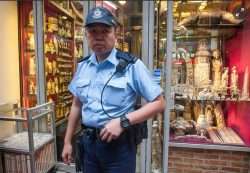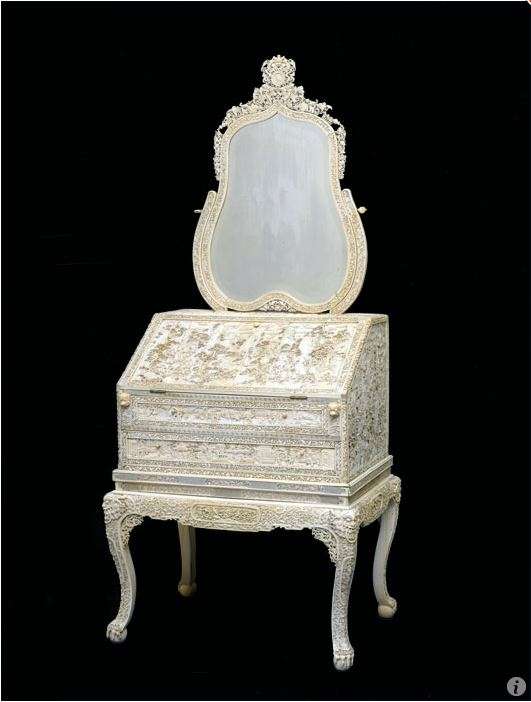Ivory Ban Hearing October 21, Massachusetts Supporters Missed the Real Problem
Posted by: plcombs Dealers Chinese Art – Antiques
RE: Massachusetts Senate Bill 440 and House Bill 1275
Addendum: November 18, 2015 Senate Hearing on S 440
Addendum: Elephant Poaching Myths and Politics

Chinese Naval Ship In Tanzania, the Sailors bought so much Ivory they doubled the price of Ivory in the region.
The Ivory Ban Hearing October 21 in Boston was a fascinating day. In the end the strongest argument to enact such a ban was driven more by emotional appeals than the actual facts driving the illicit poaching trade and why it continues at such a massive level in mainland China and Hong Kong.
Age To Proponents Mean Nothing
The hearing was held for comments regarding the proposed state wide sales BAN of all items containing endangered species products regardless of age. The regardless of age part is why I was there. The law if enacted as proposed would make the sale of Antiques containing Ivory or Rhino horn and a bevy of other items illegal and thus worthless, including Scrimshaw. The end result would cost collectors and dealers in possession of antiques composed of any Ivory or other endangered material tens of millions of dollars in Massachusetts alone. Perhaps much more, while at the same time making zero impact on the problem. For one glaring reason, the United States in it's entirety despite being the second largest market (at 1%) allegedly for Ivory is such a minor portion of the trade that removing US consumption would do nothing to diminish demand in China (99+%).
The turn out was massive for both opponents and proponents resulting in a standing room crowd, after about an hour the entire hearing was moved (very wisely) from the rather small and very warm meeting room A-1 down stairs to the much bigger Gardner Auditorium.
Thank you Chair John V. Fernandes and William N. Brownsberger
The hearing was most ably and fairly conducted by Judiciary House Chair John V. Fernandes and Senate Judiciary Chair William N. Brownsberger. They had their hands full as dozens of people wanted to testify, perhaps as many as 75, I lost track. Among them were a slew of nice 8th graders who with their teachers had taken up supporting the two Bills and were also given ample time to speak. They all did a good job too.
Before getting into the hearing, let's first take a look at the real problem and it's not in the United States.
The core problem; The Chinese Government's Role in "Legal" Ivory Trade
Its ALL about China and nothing else
Many in the west believe for some odd reason the smuggling of tusks and rhino horns out Africa and into China is being done only by clever criminals who some how evade detection into both mainland China and Hong Kong. While some of the smugglers are of course criminals, the Chinese government has no interest in stopping it in any serious way as they too are in the ivory business. Selling brand new Ivory is not only legal and allowed, the Chinese government itself is a major player in the trade. In China they have what's known as "Legal" and "Illegal" new ivory, however the regulations are more on paper than enforced in any serious way.
The Chinese Government's Ivory Business
About "Legal" ivory", each year the Chinese government sells in allotments at auction Ivory to over one hundred manufacturers for carving and eventual resale throughout the country. Once these factories' allotment is used up, usually in a matter of a few months, Ivory dealers and factories turn to the black market and buy "Illegal" ivory. It's been argued that without the black market these businesses cannot survive on the "Legal" allotment alone, as a consequence the "Illegal" activity is ignored as the Chinese government makes a fortune off the annual allotment auctions which they get basically for free through confiscation. The Chinese government also has it's own factories carving and selling ivory. It's a legal thriving business in China and Hong Kong. The biggest consumers by far are the Chinese themselves.
Ivory Retail Stores
Hollywood Road, the major shopping district in Hong Kong for example is lined with dozens of shops openly selling new carved ivory products right in their windows. On occasion protests against the trade of ivory occur there, during these events these stores are often guarded by Hong Kong policemen. In Beijing and throughout China places like the "Friendship Store" run and owned by the government also openly sells "Legal" (new) Ivory. The store in Beijing is right next door to a "Baskin and Robbins".
The Driver's Behind Illegal Ivory and Rhino Horn Poaching, Is a Legal Open Market in China
During the last 5 or 6 years the world has witnessed a rapid increase in the slaughter of elephants and rhinos throughout Africa, a big percentage of which is occurring in Tanzania (see the EIA report below). The primary if not nearly 100% of the cause is due to demand in Hong Kong and Mainland China by the Chinese population. The ivory is being bought as finished products or is being stockpiled by large numbers of investors and speculators who are warehousing and holding raw tusks as a store of wealth by the ton. It's important to note the rapid increase in poaching coincides with the massive numbers of Chinese citizens entering the middle class, which has by all accounts provided the economic fuel for the acquisition of illegal animal products.
Ivory Is Considered An Investment in China
Despite the rapid increase in supply in China, the prices have not declined but have risen exponentially as demand is much stronger than is currently available in that market. Historically Chinese culture has viewed ivory as a valuable commodity, not unlike gold, silver, pearls and precious gems. This also includes as well Chinese art which has risen in value astronomically in the last 15 to 20 years, also due to demand in China. As is evidenced by the sale of a rare tiny Ming porcelain wine cup that sold for $36,000,000 a couple years ago to a Shanghai collector. (yes thirty six million dollars)
While the US is perhaps statistically the second largest market, the amount involved is so miniscule relative to Chinese consumption and demand, any changes in laws here will in no way effect demand there. As a consequence neither State or Federal laws will diminish the amount of poaching taking place in Africa and Asia. In this equation the US market is utterly irrelevant.
Now for some good news,
In the last year three of Hong Kong's largest retailers of Ivory have voluntarily decided to stop selling Ivory due to pressure from environmentalists. They are the Yue Hwa Chinese Products Emporium Ltd, Chinese Arts & Crafts (H.K.) Ltd (CAC) and Wing On Department Store.
So far calls from numerous causes have had no effect in any changes to the laws there. Pressure is building though, however so far there has been no indication the Chinese government will end it's annual auction and allotment system of dispersing ivory stockpiles to Chinese businesses.
China is where things need to change and only they have the power to do it.
The EIA Report On Tanzania, Smuggling and the Chinese Government's Role
Tanzania is the largest source of contraband Ivory and Rhino horns in all of Africa. The vast majority of the traffic is permitted by corrupt government officials, the EIA Report is a snapshot of just what's going there, other similar operations are going on elsewhere on the continent as well. The Environmental Investigation Agency's report below sums it all up very well.
Regarding China from the EIA report; "LONDON: A new report reveals that Chinese-led criminal gangs are conspiring with corrupt Tanzanian officials to traffic huge amounts of ivory, a trade which has caused half of Tanzania’s elephants to be poached in the past five years – even diplomatic visits by high-level Chinese Government delegations have been used to smuggle ivory.”
On: Page 8, note no major seizures in China
Page 21-22, The Chinese naval ship
Page 27, Vietnam refuses to allow an investigation of Ivory into the country
Page 28, Chinese Gov't Owned Ivory Factories and Stores
Page 29-30, The Chinese Government's Profit Motive in Ivory Trade
So, what did we learn at the Ivory Ban Hearing October 21?
Well, first off in full disclosure I am obviously 100% opposed the proposed Bills, which I'll get into shortly.
As for those who support the proposed laws, I'll list some of the reasons given for backing passage of these measures.
From the Supporters of the Ivory Ban Hearing October 21 in a Nutshell
- Massachusetts is the forth largest market in the United States for the sale of Ivory. The source of this statistic came from a survey done a by a supporter of the bill based on an informal survey conducted on "Craig's List".
- The United States is the second largest Ivory market in the world after China.
- New poached Ivory is smuggled into the US disguised as antique after being "treated" so telling the difference is almost impossible.
- Elephants and Rhinos are becoming extinct and that by passing this law it will diminish demand for Ivory and Rhino products in the USA.
- Revenues from Ivory and Rhino poaching funds terrorism in Africa.
- Ivory is confiscated regularly at Airports from tourists returning from Asia and Africa.
- If Massachusetts passes this Bill we will be in line with California, New York and New Jersey who have passed similar laws. Which will encourage other states to do the same and will ultimately reduce the demand. This proponents believe will send a message, forcing China to stop the practice and crack down on smuggling.
- Antique dealers sell illegal Ivory mixed in with authentic LEGAL antique Ivory.
- The Federal laws in effect are not sufficient on a State by State basis due to limitations of enforcement.
- Massive seizures inside the US prove current laws are not working.
- Tourists have Ivory confiscated at Logan airport upon return from abroad.
- Operation Crush, a couple years ago the US Fish and Wildlife Service destroyed the entire stockpile of Ivory confiscated in the US since the Endangered Species Act began 40 years ago. The total by weight was the equivalent of 44 pairs of tusks. (during those 40 years
From the Opponents of the Ivory Ban Hearing October 21 in a Nutshell (including me)
- "Craig's List" surveys not withstanding, there is no proof that Massachusetts is the forth largest Ivory market in the USA or for illegal animal products of any kind. There is a lot of fine antique Ivory in New England clearly, all due to our long history of trade in Asia starting in the 18thC right through the early 20th C. One only need visit the Museum of Fine Art Boston, The Isabella Stewart Gardner Museum, The Forbes Museum or the Peabody Essex Museum to get an idea of what's available in the Massachusetts antiques market.
- Current Laws have been nearly 100% effective. While the United States may (and may not be) the second largest Ivory market after China, according to the Fish and Wildlife Service, 99.8% of all Ivory poached ends up in China, other experts say the number is actually closer to 99.97%.
- (my own testimony) Never in over 3 decades or working as a dealer of Asian antiques have I ever been approached or asked by anyone deal in illegal Ivory or Rhino horns. Frankly speaking I never see the stuff in the Boston or New England market.
- Illegal or Modern "Treated" Ivory is not hard to distinguish from Antique examples by collectors and dealers.
- Only a handful of prosecutions of commercial Ivory traffickers have taken place in the US during the last 40 years.
- Rhino horn trafficking in the USA is very rare and consists nearly 100% in the purchasing of trophy horns taken by American big game hunters many years ago and being bought by Chinese nationals to take back to China.
- There is no evidence that rhino horn trafficking into the US exists. Today virtually 100% of all rhino horns are used in traditional Chinese medicines.
- Tourists returning from abroad through Logan Airport sometimes bring back legally bought foreign Ivory, but is not allowed into the US after being declared in Customs...
- The price of Ivory in China and Hong Kong is 5 to 10 time higher than in the USA, coupled with the risks associated with bringing it to the USA prevents any large scale smuggling into the America.
- There are ample stocks of LEGAL pre-ban Ivory already in the US further reducing any demand for smuggled pieces.
- Of the hundreds of thousands of antique dealers in the USA, virtually none have been charged with illegal Ivory sales or trafficking.
- Making currently legal pre-ban Antiques fully composed of or partially composed of Ivory will cost collectors and dealers tens of millions of dollars.
- (My own testimony) The Chinese Government is involved directly in the trade of poaching, manufacturing-carving and the selling of illegal Ivory.
- No testimony, beyond a vague accusation that Antique dealers are regularly involved in the illicit trade was produced during the hearing, nor was there any citing of Antique's dealers involvement in the trade at all beyond a couple in the last 40 years. (the notion that dealers might be unwittingly involved is absurd.)
The Disconnect, Antique Dealers, Illegal Trafficking and a Bad Piece of Legislation
If we look at the reality of the drivers, participants and who is profiting most from illegal trade in poached animal products, it's fairly evident the problem isn't antique dealers and collectors in Boston, Massachusetts or across the United States. Antique dealers, craftsmen and collectors are however a convenient target. They are a relatively small group with no organizational structure that can push back effectively against a bevy of large well funded animal rights groups. The Ivory ban hearing October 21 showed quite clearly whats happening is more a mass hysteria than a fact driven discussion.
The Illogical Results of Mindless Browbeating
These powerful animal groups have so far managed to COW into passing BAN legislation in several states including New York, California and New Jersey by appealing to the emotional side of the debate without any actual evidence that such legislation will or has had any positive impact. The only impact are the economic losses of income and value to collections, while at the same time pushing into closets and basements essential and important aspects of our own material culture. It's a high price to pay for a self congratulatory slap on the back and high fives for feel good legislation that does nothing to solving a real problem.
Political Correctness. Lets face it, for legislators to oppose this legislation puts them at risk of being attacked as "animal haters" or even worse in favor of killing elephants and rhinos. By supporting it and throwing a few antique dealers under the bus while devaluing the collections of "the Rich" and at the same time taking a stand on "Blood Ivory" has no downside politically.
This Bill in it's entirety should be tossed in the rubbish. To reject it will take courage and is the right thing to do. For th0se who believe this type of legislation will impact any aspect of poaching in Africa and diminish demand they are kidding themselves, this belief only belies an utter and complete mis-understanding of what is foistering this terrible industry.
What this law will do Ivory Ban Hearing October 21
The only effect this and other similar laws will have and have had is to diminish an appreciation of our own culture and history. Museums will suffer, scholarship will suffer and we will all suffer as historic objects slowly vanish from view. Not to mention the losses in tax revenue due the collapse of sales of these antiques as well as it's impact on estate taxes. As collectors die leaving behind soon to be economically worthless art collections that before were worth hundreds of millions will no longer have any market value, thus no estate tax value. Any antique object with Ivory or now "endangered species" content will be worth ZERO including; Rare sterling tea services, religious artifacts, antique furniture, paintings, Asian art, musical instruments, scrimshaw, billiard tables, African art, south and central American art, native American art, Eskimo and Inuit art to name a few. All done for nothing the result of good intentioned but ill informed decision driven by a misguided belief that such a prohibition will alter a deep cultural demand which does not align with our own. It will do absolutely nothing other than cause damage here.
On a personal note, as a group, I can think of few other industries where you have more animal lovers and advocates for animal causes than those involved in the Arts. To punish them while trying to alter a cultural behavior half way around the world is just illogical, as is this entire effort.
So Now What? Recently an article appeared advocating for a new type of legal Ivory trade..
http://www.taipeitimes.com/News/editorials/archives/2014/02/17/2003583685
Other news on the current state of
[newsplugin_feed id='1447085546696' title='Elephant Poaching' keywords='Elephant Poaching' count='20' show_date='true' show_source='true' show_abstract='true' search_mode='title' sort_mode='relevance' age='3000' feed_mode='auto']



Leave a Reply